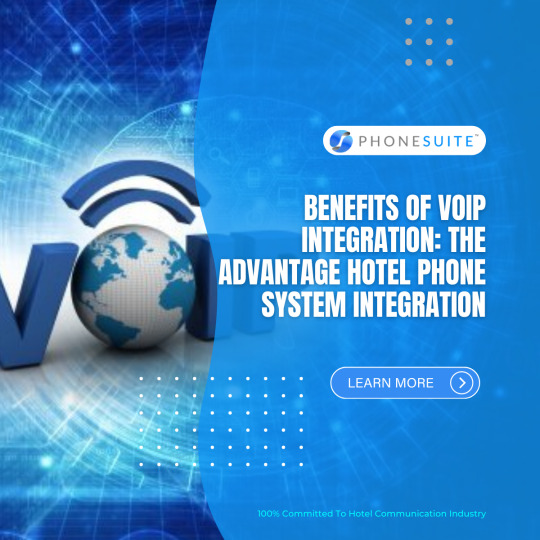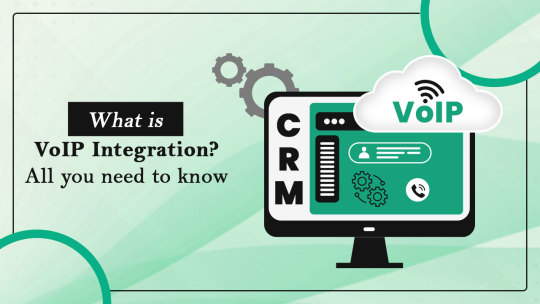#VoIP integrations
Text

In this article, we’ll explore the benefits of VoIP integrations and how they can improve your hotel business phone systems communication. Read More.....
#VoIP integrations#Hotel Phone System#phone systems#Communication Capabilities#Colorado Telephone System#Hotel Business#Hotel VoIP Business#colorado phone system#on premise services#managing a hotel#voip means#mobilevoip#voip system features#pbx communications#hotel hospitality#voip solutions#voip services#VoIP
5 notes
·
View notes
Text

PhoneSuite is leading the industry with its revolutionary CRM integration that are designed specifically to help hotel marketers succeed with integrated marketing automation tools, communication suite reduction capabilities, data synchronization features, and more – let’s dive into how our Hospitality CRM Integration can take your hotel marketing to the next level. Read More....
#PhoneSuite’s Hospitality CRM Integration#Hospitality CRM#VoIP & CRM Integration#Unified Communications#CRM#phonesuite direct#phonesuite dealers#PBX System#VoIP#VoIP Phone#VoIP Advantages#Hotel Phone System#IP telephony#Ip Pbx System#Cloud Pbx System#Managed Voice#Pbx System in Texas#VoIP Phone System#VoIP technology#Telephony solutions#PBX Communications#SIP Trunks#Voice call#Voice Calls#Modern Telephone#VoIP Telephone#hotel hospitality#hotel VoIP#phone pbx system#Business Phones
5 notes
·
View notes
Text
#IPPBX#SmallBusiness#VoIP#UnifiedCommunications#CloudBased#Scalable#Collaboration#Integrations#Security#Analytics
0 notes
Text
What Features Are Offered by Leading SIP Trunk Providers?

When it comes to business communication, having a reliable and efficient system in place is crucial. That's where SIP trunk providers come in. They offer a range of features that can enhance your communication infrastructure and take it to the next level. From VoIP integration and call routing to PSTN connectivity, leading SIP trunk providers have it all.
Imagine seamlessly integrating your VoIP system with your existing infrastructure. With SIP trunking, this becomes a reality. Leading providers offer robust VoIP integration capabilities, allowing you to streamline your communication channels and improve overall business efficiency. Whether you need unified communications or advanced call features, SIP trunk providers have the tools to make it happen.
PSTN connectivity plays a vital role in ensuring reliable communication between SIP trunks and traditional phone systems. With leading SIP trunk providers, you can count on robust PSTN connectivity that enables crystal-clear voice quality and uninterrupted communication. Their SIP gateways act as a bridge between the digital and analog worlds, ensuring seamless connectivity and eliminating any potential disruptions.
Efficient call routing is another feature offered by leading SIP trunk providers. They leverage advanced technologies to optimize call routing, saving you costs and improving the overall call experience. Intelligent call routing directs calls to the most appropriate endpoints, ensuring that they reach the right destination quickly and efficiently.
But it doesn't stop there. Leading SIP trunk providers also offer wholesale voice solutions for enterprise needs. Whether you require scalable and flexible communication options or comprehensive disaster recovery solutions, these providers have you covered. They understand the unique requirements of businesses and provide tailored solutions to meet those needs.
When selecting a SIP trunk provider, factors such as quality of service, security features, and service level agreements should also be considered. Leading providers prioritize these aspects, ensuring that you receive a reliable, secure, and high-quality communication experience.

In this article, we will delve deeper into the features offered by leading SIP trunk providers, explore real-world case studies, and provide you with a comprehensive guide on selecting the right provider for your business. Stay tuned to discover how partnering with a leading SIP trunk provider can revolutionize your business communication.
Understanding SIP Trunking Services
SIP trunking services, offered by reputable SIP Trunk Providers, have become a vital component of modern communication systems. Using the session initiation protocol (SIP), businesses can connect their private branch exchange (PBX) systems to the public switched telephone network (PSTN) through an internet connection.
With SIP trunking, traditional phone lines are replaced with virtual connections, allowing businesses to make and receive calls over the internet. This eliminates the need for separate physical phone lines and enables cost-effective and efficient communication.
One of the key benefits of SIP trunking is its flexibility. Unlike traditional phone systems, which have a fixed number of lines, SIP trunks can be easily scaled up or down to accommodate the changing needs of businesses. This scalability allows for better resource allocation and cost savings.
SIP trunking also offers improved call quality and reliability. By leveraging the internet for voice transmission, businesses can enjoy high-definition audio and clearer conversations. Moreover, SIP trunk providers often include robust redundancy and disaster recovery solutions, ensuring uninterrupted communication even during unforeseen events.
Another advantage of SIP trunking is its ability to enable PSTN connectivity. Businesses can connect their SIP trunks to traditional phone systems, allowing them to make and receive calls using existing hardware. This integration helps organizations leverage their existing infrastructure while enjoying the benefits of SIP trunking.
Overall, by adopting SIP trunking services from reputable providers, businesses can streamline their communication systems, reduce costs, and enhance their overall productivity. The next section will explore the integration of VoIP systems with SIP trunking, highlighting the benefits of this unified approach.
VoIP Integration for Enhanced Communication
SIP trunk providers play a crucial role in enabling seamless integration with VoIP systems, enhancing communication capabilities for businesses. By embracing VoIP integration, companies can leverage the power of unified communications to streamline their operations and improve overall efficiency.
Unified communications refers to the integration of various communication tools and platforms into a centralized system. This allows employees to access a wide range of communication channels, such as voice calls, video conferencing, instant messaging, and email, all from a single interface. With VoIP integration facilitated by SIP trunk providers, companies can achieve a higher level of collaboration and productivity.
Through the integration of VoIP systems, businesses can experience several benefits. Firstly, VoIP enables cost-effective communication by utilizing the internet for voice calls rather than traditional phone lines. This eliminates the need for separate phone systems, resulting in significant cost savings for businesses.
youtube
Additionally, VoIP integration allows for greater flexibility and scalability. SIP trunk providers offer businesses the ability to add or remove VoIP channels as needed, accommodating fluctuations in communication requirements. This scalability ensures that businesses can easily adapt to changing needs without incurring unnecessary costs.
Benefits of VoIP Integration:
Cost-effective communication through the use of internet telephony
Improved collaboration and productivity with unified communications
Flexibility and scalability to meet changing communication needs
Enhanced mobility and remote accessibility
Seamless integration with existing communication systems
In summary, VoIP integration facilitated by SIP trunk providers empowers businesses with efficient and unified communication solutions. By leveraging the benefits of VoIP systems, companies can optimize their communication workflows, enhance collaboration, and achieve a competitive edge in today's digital landscape.

Robust PSTN Connectivity for Reliable Communication
When it comes to business communication, reliability is key. That's why having robust PSTN connectivity is crucial for businesses seeking uninterrupted and dependable phone system connectivity. SIP trunk providers play a vital role in ensuring this robust connectivity through the use of SIP gateways.
SIP gateways act as the bridge between SIP trunks and traditional phone systems, allowing for seamless communication between the two. They enable businesses to connect their IP-based phone systems to the Public Switched Telephone Network (PSTN), ensuring that calls can be made and received without any disruptions.
With SIP gateways, businesses can leverage their existing phone systems while taking advantage of the cost savings and additional features provided by SIP trunking services. Whether it's making local or international calls, SIP gateways ensure that the communication is reliable and of high quality.
By partnering with a leading SIP trunk provider that offers robust PSTN connectivity, businesses can enjoy the benefits of a dependable and efficient phone system. They can confidently communicate with clients, customers, and partners, knowing that their calls will go through smoothly and without any hiccups.
Benefits of robust PSTN connectivity provided by SIP trunk providers:
Reliable and uninterrupted communication
Seamless integration between SIP trunks and traditional phone systems
Cost savings by leveraging existing phone systems
High-quality voice calls, both local and international
With robust PSTN connectivity provided by SIP trunk providers, businesses can achieve reliable and consistent communication, allowing them to focus on their core operations and serve their customers effectively.
Efficient Call Routing for Cost Savings
When it comes to business communication, efficient call routing plays a crucial role in ensuring seamless connectivity and optimizing costs. Leading SIP trunk providers offer robust call routing capabilities that enable businesses to streamline their communication processes and drive cost savings.
Call routing involves the intelligent distribution of incoming calls to the most appropriate destination within an organization. With SIP trunking, businesses can leverage advanced call routing features to enhance their overall communication efficiency. These features include:
Automatic call forwarding: Incoming calls can be automatically redirected to different extensions or departments based on pre-defined rules. This ensures that calls are efficiently routed to the most suitable individuals or teams, minimizing the need for manual intervention.
Time-based routing: Businesses can set up call routing rules based on specific time frames. For example, calls received outside of office hours can be redirected to voicemail or a designated on-call team, ensuring that no important calls go unanswered.
Geographical routing: SIP trunk providers also offer geographical call routing functionality. Calls can be directed to different locations or branches based on the caller's geographical location. This ensures that customers are connected to the most relevant and geographically suitable agents or representatives.
By implementing efficient call routing strategies, businesses can achieve significant cost savings. With intelligent call routing, organizations can reduce unnecessary call transfers and minimize the time spent on handling each call. This optimized call flow helps enhance productivity and customer satisfaction while reducing operational costs.
Moreover, leading SIP trunk providers offer flexible pricing models for their call routing services, allowing businesses to pay for the specific call routing features they require. This ensures cost-efficient communication solutions tailored to their unique needs and enables them to avoid unnecessary expenses.
With the right call routing capabilities provided by leading SIP trunk providers, businesses can maximize their communication efficiency, reduce costs, and deliver exceptional customer experiences.

Wholesale Voice Solutions for Enterprise Needs
SIP trunk providers offer wholesale voice solutions tailored to meet the specific communication needs of enterprises. These solutions enable businesses to streamline their voice services while enjoying cost savings and improved efficiency. Let's explore how wholesale voice, wholesale VoIP, and wholesale voice termination can benefit your enterprise.
Benefits of Wholesale Voice Solutions
Cost Savings: Wholesale voice solutions allow enterprises to purchase voice services in bulk at discounted rates, resulting in significant cost savings compared to traditional voice services.
Scalability: These solutions are highly scalable, allowing businesses to easily add or remove channels based on their changing communication needs.
Reliable Performance: Leading SIP trunk providers ensure high-quality voice termination services, providing crystal-clear voice communication for seamless business operations.
Flexibility: Wholesale voice solutions offer businesses the flexibility to choose the most suitable voice termination options, such as local, international, or toll-free numbers.
Centralized Management: Enterprises can manage their voice services centrally, reducing administrative complexities and enhancing overall control of their communication systems.
Wholesale VoIP and Voice Termination
Wholesale VoIP allows businesses to transmit voice calls over the internet. By partnering with a reputable SIP trunk provider, enterprises can benefit from wholesale VoIP services that offer extensive coverage, competitive pricing, and exceptional call quality. Wholesale voice termination refers to the process of routing voice calls to their intended destinations across various networks. SIP trunk providers ensure seamless voice termination, ensuring that businesses can connect with their customers and partners without any disruptions.
Scalability and Flexibility of SIP Trunking
When it comes to business communication, adaptability is key. That's why SIP trunking services from leading providers offer unmatched scalability and flexibility, allowing businesses to easily adjust their communication infrastructure as their needs evolve.
With SIP trunking, businesses can add or remove SIP channels effortlessly, enabling them to optimize their resources and costs. Whether you need to accommodate a sudden increase in call volume or scale down during slower periods, SIP trunking allows for seamless adjustments without disrupting your operations.
By partnering with reliable SIP trunk providers, businesses gain access to the internet telephony solutions they need to connect with customers, clients, and partners across the globe. Leveraging the power of SIP channels, organizations can establish high-quality voice calls and exchange data efficiently, regardless of geographical boundaries.
What's more, SIP trunking services enable businesses to integrate modern communication technologies seamlessly. By leveraging internet telephony, companies can enjoy the benefits of unified communications, combining voice, messaging, and other collaboration tools into a single, cohesive platform.
By harnessing the scalability and flexibility offered by SIP trunking, businesses can future-proof their communication systems, ensuring they can adapt to evolving customer demands and industry trends. Whether it's expanding to new markets, supporting remote workforces, or implementing advanced communication features, SIP trunking provides the foundation for growth and innovation.

In the next section, we will explore the robust redundancy and disaster recovery solutions offered by leading SIP trunk providers, ensuring uninterrupted communication even during unforeseen events.
Redundancy and Disaster Recovery Solutions
Leading SIP Trunk Providers understand the critical need for uninterrupted communication in today's business landscape. That is why they offer robust redundancy and disaster recovery solutions to ensure seamless operations even during unforeseen events.
Disasters such as natural calamities or system failures can significantly disrupt communication channels, leading to loss of productivity and potential revenue. However, businesses can mitigate these risks by partnering with SIP Trunk Providers that prioritize disaster recovery solutions.
Redundancy for Reliable Communication
SIP Trunk Providers leverage redundant infrastructure to maintain service availability and minimize downtime. By deploying multiple data centers located in geographically diverse regions, these providers ensure that even if one location goes offline, communication remains uninterrupted. This redundancy eliminates single points of failure, resulting in highly reliable and resilient SIP trunking services.
Furthermore, leading providers employ advanced failover mechanisms to seamlessly switch traffic to an alternate data center in case of any disruption. This automated process helps maintain continuity and enables businesses to overcome challenges without any significant impact on their communication systems.
Disaster Recovery Solutions for Business Continuity
In addition to redundancy, SIP Trunk Providers offer comprehensive disaster recovery solutions to safeguard businesses during emergencies. These solutions include backup strategies, data replication, and failover procedures to ensure that critical communication services are quickly restored in the event of a disaster.
By implementing disaster recovery plans and backup systems, SIP Trunk Providers can swiftly recover data, reroute calls, and restore services, minimizing any potential loss of communication and allowing businesses to resume operations promptly.
Benefits of Redundancy and Disaster Recovery Solutions
Ensures uninterrupted communication, enhancing business continuity
Minimizes potential revenue loss during downtime
Provides peace of mind knowing that communication channels are protected
Facilitates quick restoration of services, reducing downtime impact
Improves overall reliability and resilience of communication systems
By partnering with a SIP Trunk Provider that prioritizes redundancy and disaster recovery solutions, businesses can effectively safeguard their communication infrastructure, enabling them to stay connected even in the face of adversity.
Quality of Service and Service Level Agreements
When it comes to SIP trunking services, the quality of service (QoS) offered by SIP trunk providers is paramount. Whether you are a small business or a large enterprise, ensuring reliable and high-quality communication is essential for seamless operations.
Quality of service refers to the performance and reliability of the voice and data transmission over SIP trunks. It encompasses factors such as call clarity, minimal latency, and consistent bandwidth allocation. Achieving a high level of quality requires the expertise and infrastructure provided by reputable SIP trunk providers.
SIP trunk providers understand the significance of QoS and strive to deliver exceptional performance. They maintain robust networks and employ advanced technologies to ensure crystal-clear voice calls and smooth data transmissions. By prioritizing QoS, businesses can avoid issues like dropped calls, poor audio quality, and data loss.
In addition to QoS, service level agreements (SLAs) play a crucial role in guaranteeing reliable communication. SLAs are contracts between businesses and SIP trunk providers that outline the expected level of service. They define metrics such as uptime percentage, call completion rates, and response times for support inquiries.
With SLAs in place, businesses can have peace of mind knowing that their communication system is backed by guarantees. In the event of any service disruptions, providers are bound to resolve issues promptly, minimizing downtime and ensuring uninterrupted operations.
SIP Trunk Providers: Ensuring High-Quality Communication
Advanced network infrastructure: Leading SIP trunk providers invest in state-of-the-art network infrastructure to deliver superior quality of service. They prioritize traffic to minimize latency, jitter, and packet loss.
Bandwidth management: Providers allocate and manage bandwidth effectively to ensure consistent performance even during peak usage periods. This allows businesses to maintain optimal communication quality without bottlenecks.
Quality monitoring and optimization: SIP trunk providers continuously monitor and optimize their services to identify and address potential quality issues. They employ proactive measures to maintain the highest standards of communication quality.
Redundancy and failover systems: To ensure reliable communication, providers have redundant systems in place. In the event of any network or hardware failures, failover systems seamlessly switch to backup routes, minimizing service disruptions.
By partnering with a reputable SIP trunk provider, businesses can leverage their expertise and infrastructure to achieve exceptional quality of service. This translates into clearer calls, smoother data transfers, and enhanced overall communication experiences.
Next, we'll explore the security and encryption features offered by leading SIP trunk providers to ensure the privacy and protection of your communication. But first, let's take a moment to visualize the importance of quality of service in SIP trunking services.

Security and Encryption Features
When it comes to business communication, security is paramount. Leading SIP Trunk Providers understand this and offer robust security measures and encryption features to ensure the confidentiality and integrity of your communications.
One of the key security features offered by SIP Trunk Providers is Transport Layer Security (TLS). TLS encrypts the communication between your organization and the service provider, preventing unauthorized access and eavesdropping. It provides end-to-end encryption, keeping your data secure from the moment it leaves your network until it reaches its destination.
In addition to TLS, providers often employ Secure Real-time Transport Protocol (SRTP) for securing voice and video calls. SRTP encrypts the media streams, making sure that your conversations cannot be intercepted or tampered with. This adds an extra layer of protection to your sensitive business communications.
SIP Trunk Providers also implement firewalls and intrusion detection systems to safeguard against unauthorized access attempts. These security measures monitor and block suspicious activity, protecting your network from potential threats.
Furthermore, some providers offer multi-factor authentication (MFA) to enhance security. With MFA, users are required to provide additional verification, such as a unique code sent to their mobile device, before accessing the SIP trunking service. This reduces the risk of unauthorized access even if login credentials are compromised.
By leveraging the security features provided by leading SIP Trunk Providers, businesses can have peace of mind knowing that their communications are protected from external threats. Choosing a provider that prioritizes security ensures the confidentiality, integrity, and availability of your critical business communications.
SIP Trunk Provider Comparison: Factors to Consider
When choosing the right SIP trunk provider for your business phone solutions, it's essential to carefully evaluate and compare different options. To ensure that you make an informed decision, consider the following key factors:
Reliability: Look for SIP trunk providers that have a proven track record of reliable service and uptime. Check customer reviews and testimonials to get an idea of their performance.
Call Quality: High-quality voice calls are crucial for effective business communication. Consider providers that offer advanced technologies and prioritize call quality.
Scalability: Your business communication needs may change and grow over time. Choose a provider that allows easy scalability, enabling you to add or remove trunks as per your requirements.
Cost: Compare pricing plans offered by different providers, considering both setup costs and ongoing charges. Look for transparent pricing models without hidden fees.
Compatibility: Ensure that the SIP trunk provider is compatible with your existing phone system and equipment. This compatibility will simplify integration and minimize potential disruption.
Customer Support: Evaluate the level of customer support offered by each provider. You'll want a provider that provides timely and reliable support to address any issues that may arise.
Security: Business communication requires robust security measures to protect sensitive information. Look for providers that offer encrypted communication and have strong security protocols in place.
By carefully considering these factors, you can select a SIP trunk provider that best meets the unique needs of your business, ensuring seamless and efficient communication.

How to Select the Right SIP Trunk Provider
When it comes to implementing SIP trunking for your business, selecting the right SIP trunk provider is crucial for achieving seamless communication. With numerous providers available in the market, it can be overwhelming to choose the one that best fits your business needs. To help you make an informed decision, follow this step-by-step guide:
Evaluate your business requirements: Before selecting a SIP trunk provider, assess your communication needs. Consider factors such as the number of concurrent calls, anticipated call volume, and desired features like call routing and voicemail-to-email.
Research reputable providers: Look for SIP trunk providers with a proven track record and positive customer reviews. Research their industry experience, customer support services, and the range of features they offer.
Compare pricing: Obtain quotes from different providers and compare their pricing structures. Consider any additional fees, such as setup fees or charges for exceeding usage limits.
Evaluate call quality: Quality of service (QoS) is crucial for ensuring clear and reliable communication. Inquire about the provider's network infrastructure, redundancy measures, and service level agreements (SLAs) that guarantee call quality.
Inquire about network coverage: Ensure that the provider's network coverage aligns with your business requirements. If your business operates in multiple locations, confirm that the provider can offer reliable service in all those areas.
Consider scalability: Assess the provider's scalability offerings to accommodate your business growth. Check if they can easily add or remove SIP channels as your communication needs evolve.
By following these steps, you can confidently select the right SIP trunk provider for your business. Remember to prioritize factors such as reliable service, competitive pricing, and excellent customer support. With the right provider, you can enhance your business communication and streamline your operations.

Benefits of Partnering with a Leading SIP Trunk Provider
Partnering with a leading SIP Trunk Provider can offer numerous advantages and play a pivotal role in enhancing your business communication. These providers bring a wealth of value-added services, reliability, and expertise to ensure seamless connectivity and efficient operations.
One of the primary benefits of partnering with a leading SIP trunk provider is the access to advanced technology and infrastructure. These providers invest heavily in state-of-the-art equipment, software, and network infrastructure, enabling businesses to leverage the latest communication solutions. This ensures that your organization stays ahead of the curve in today’s fast-paced digital landscape.
A leading SIP trunk provider also offers unmatched reliability. By utilizing redundant networks, advanced failover systems, and disaster recovery solutions, they ensure uninterrupted communication even during unforeseen events or network disruptions. This ensures seamless connectivity and minimizes downtime, allowing your business to operate smoothly.
Furthermore, collaborating with a reputable SIP trunk provider grants access to a range of value-added services. These include features such as auto-attendants, call recording, call forwarding, and virtual phone numbers. These services enhance the functionality and efficiency of your business phone system, improving customer experience and overall productivity.
In addition to the technical aspects, partnering with a leading SIP trunk provider offers the advantage of expertise and support. These providers have a team of experienced professionals who understand the intricacies of SIP trunking and can provide valuable guidance and support. Whether it's setting up the system, troubleshooting issues, or optimizing performance, their expertise ensures that you get the most out of your SIP trunking investment.
Moreover, working with a trusted SIP trunk provider strengthens your business's security and compliance. These providers implement robust security measures, including encryption protocols and firewalls, to safeguard your communication channels and protect sensitive data. This peace of mind allows you to concentrate on your core business without worrying about potential security breaches.
By partnering with a leading SIP trunk provider, businesses also benefit from cost savings. As compared to traditional phone systems, SIP trunking offers significant cost advantages, including lower long-distance and international call rates, reduced maintenance costs, and simplified infrastructure. These savings can directly impact your bottom line and contribute to overall business growth.
In conclusion, partnering with a leading SIP trunk provider offers a plethora of benefits, such as advanced technology, enhanced reliability, value-added services, expert support, improved security, and cost savings. By leveraging the expertise and services provided by these providers, businesses can streamline their communication processes, enhance productivity, and stay competitive in the ever-evolving business landscape.
Conclusion
Choosing a leading SIP trunk provider is crucial for businesses seeking enhanced communication capabilities. Throughout this article, we have explored the key features offered by these providers and how they can benefit your organization. By understanding SIP trunking services and their integration with VoIP systems, businesses can achieve seamless communication across different channels.
Robust PSTN connectivity ensures reliable communication between SIP trunks and traditional phone systems, while efficient call routing capabilities can lead to cost savings and improved efficiency. Furthermore, wholesale voice solutions offered by leading SIP trunk providers cater to the enterprise needs of businesses, enhancing their communication infrastructure.
Scalability and flexibility are inherent in SIP trunking services, allowing businesses to adapt to changing communication requirements easily. With built-in redundancy and disaster recovery solutions, interruptions to communication are minimized, ensuring business continuity. Additionally, these providers prioritize quality of service through service level agreements, guaranteeing reliable and high-quality communication.
Security features and encryption protocols offered by leading SIP trunk providers ensure the confidentiality and integrity of business communications. By carefully considering the factors mentioned in this article and conducting a thorough assessment, businesses can select the right SIP trunk provider that aligns with their specific needs and goals. Partnering with a leading SIP trunk provider brings a host of benefits, including value-added services and expertise that optimize business communication.
In conclusion, choosing a leading SIP trunk provider lays a strong foundation for reliable, secure, and efficient business communication. By embracing high-quality SIP trunking services, businesses can streamline their communication systems and gain a competitive edge in today's digital landscape.
#SIP trunking services#VoIP providers#Business phone solutions#PSTN connectivity#VoIP integration#SIP channels#Session Initiation Protocol#Unified Communications#Internet telephony#SIP protocol#SIP gateway#Phone system connectivity#SIP trunk pricing#Call routing#PBX integration#SIP trunk setup#VoIP connectivity#SIP service providers#SIP trunk features#SIP termination#Youtube
1 note
·
View note
Text
Voice-based OTP Services: Implementing Two-Factor Authentication Best Practices
Data security is a huge concern for modern businesses. Hence, in addition to VoIP services for small business, even voice OTP services have become quite popular today. OTP verification is a security measure that gives users greater control over their existing account and profile activities. OTP services can be implemented with Voice API integration for two-factor authentication (2FA). 2FA basically is a security measure that requires users to provide two different pieces of evidence to verify their identity when logging in to an account. Maintaining this practice can help protect accounts from unauthorized access, even if the user's password gets compromised.
To ensure the effectiveness of 2FA while using voice-based OTP services, it is vital to follow these best practices:
Secure communication channels: It is better to secure communication protocols like HTTPS for transmitting OTPs to users via voice calls.
Short validity period: The OTPs should be valid for a short period (e.g., 1-5 minutes) to reduce the risk of OTP reuse if intercepted.
Limit retries: Companies should consider limiting the number of OTP entry attempts before locking out the user to avoid risks.
Use a reputable voice-based OTP service provider: Many leading providers of Enterprise voice Solutions offer voice OTP services today. Among them, businesses should prioritize finding a company that is well established and has a good track record of security and reliability.
Educate the customers or users about voice-based OTP: While the process of voice OTP is pretty simple, it is vital for companies to educate your users about how to use voice-based OTP and to explain the benefits of 2FA.
Monitor the voice-based OTP service usage: Discerning businesses, especially the ones based in the finance or banking sector should monitor their voice-based OTP service usage to identify any suspicious activity.
Following the simple yet important practices underlined above would be advantageous for any company using voice OTP services.
0 notes
Text
What is VoIP Integration? All you need to know

Voice over Internet Protocol (VoIP) technology has revolutionized the way we communicate, offering a range of benefits that traditional phone systems simply cannot match. With VoIP, voice calls are transmitted over the Internet rather than traditional phone lines, which means that communication is faster, more reliable, and more cost-effective. However, transitioning to VoIP can be challenging for many organizations, particularly if they already have an existing communication system. This is where VoIP integration comes in – it provides a way to incorporate VoIP technology into an existing communication system, bringing all the benefits of VoIP without the need for a complete overhaul.
In this blog post, we’ll take a closer look at VoIP integration, what it involves, and why it’s such an important consideration for businesses looking to upgrade their communication systems.
What is VoIP Integration?
VoIP integration refers to the process of integrating VoIP technology into an existing communication system or application. For example, this might involve integrating a VoIP system with a current PBX system, integrating VoIP functionality into software applications like CRM or ERP systems, or even integrating VoIP with other communication channels like video conferencing or instant messaging.
At its most basic level, VoIP integration involves the use of specialized hardware and software to connect a VoIP system to an existing communication infrastructure. For example, this might involve the installation of specialized gateways or routers to manage traffic flow between the two systems, or it might involve using APIs (Application Programming Interfaces) to integrate VoIP functionality directly into other applications.
Why is VoIP Integration Important?
For many organizations, the benefits of VoIP are clear – lower communication costs, enhanced call quality, improved productivity, and greater flexibility. However, the process of transitioning to VoIP can be daunting, particularly for those organizations that have already invested heavily in existing communication infrastructure.
This is where VoIP integration comes in. By integrating VoIP technology into an existing system, businesses can leverage the benefits of VoIP without the need for a complete overhaul of their communication infrastructure. This means that they can enjoy all the benefits of VoIP while still being able to use existing communication systems and applications.
For example, consider a business with an existing PBX system. Rather than replacing the entire system with a new VoIP-based solution, they could integrate a VoIP gateway with their existing PBX system, allowing them to make and receive VoIP calls using their existing phones and phone numbers. This means that they can still use their existing phone system while also enjoying the benefits of VoIP technology.
Similarly, businesses can integrate VoIP functionality into other applications like CRM or ERP systems, providing employees with the ability to make and receive calls directly from these applications. This can help to streamline communication processes and improve overall efficiency, as employees no longer need to switch between applications to make or receive calls.
Overall, VoIP integration is an important consideration for businesses looking to upgrade their communication systems. By integrating VoIP technology into existing systems and applications, businesses can leverage the benefits of VoIP without the need for a complete overhaul of their communication infrastructure.
What are the different VoIP integrations possible?
There are several ways in which VoIP technology can be integrated into an existing communication system or application. Here are some of the most common types of VoIP integration:
VoIP Gateways: VoIP gateways are devices that connect traditional phone lines to a VoIP network. They convert analog voice signals into digital signals that can be transmitted over the internet, allowing businesses to use their existing phone systems with VoIP technology.
APIs: Application Programming Interfaces (APIs) allow businesses to integrate VoIP functionality directly into other applications like CRM or ERP systems. This means that employees can make and receive calls directly from these applications without the need for a separate phone system.
PBX Integration: A Private Branch Exchange (PBX) is a telephone system that manages incoming and outgoing calls for an organization. PBX integration involves connecting a VoIP system to an existing PBX, allowing users to make and receive VoIP calls using their existing PBX phones.
SIP Trunking: Session Initiation Protocol (SIP) trunking involves replacing traditional phone lines with VoIP-enabled connections. This allows businesses to make and receive calls over the internet using their existing phone systems.
Softphone Integration: A software-based phone application allows users to make and receive VoIP calls using their computer or mobile device. Softphone integration involves integrating a softphone application into an existing communication system, allowing users to make and receive calls directly from their computer or mobile device.
CRM Integration: Customer Relationship Management (CRM) software is used by many businesses to manage customer interactions and data. CRM with VoIP integration involves integrating VoIP functionality into a CRM system, allowing users to make and receive calls directly from within the CRM software. You can read further about the VoIP integration with CRM.
Unified Communications (UC) Integration: Unified Communications (UC) refers to the integration of various communication channels, such as voice, video, instant messaging, and email, into a single platform. UC integration involves integrating VoIP technology into a UC platform, allowing users to make and receive calls over the internet using their existing UC software.
Call Center Integration: Call centers are a critical component of many businesses, providing customer support and sales services. Call center integration involves integrating VoIP phone system into a call center software platform, allowing call center agents to make and receive calls over the internet using their existing call center software.
Virtual Phone Systems: Virtual phone systems are cloud-based VoIP phone systems that allow businesses to make and receive calls over the internet. Virtual phone systems can be accessed from anywhere with an internet connection and offer features such as call routing, voicemail, and call recording.
Benefits from VoIP Integrations for Businesses
Improved personalization
When businesses integrate their best VoIP system for CRM integrations, agents can pull recent customer data while in conversation with the customer, and this allows the conversation to be personalized. Similarly, the incoming calls could be intelligently redirected to the correct agent based on the conversation history.
Better conversions
Extensions and APIs allow for a smoother data flow, and this can speed up the conversion cycle. Agents no longer need to juggle between different tools to keep track of the information and can take critical decisions faster. Quicker decisions can be vital in sending the right message to the prospects, on the fence, and progress them on their customer journey. In addition, the right integration can synchronize your contacts across all platforms, increasing customer service response times and productivity.
Manage contact center operations remotely
VoIP is a complete cloud solution that can be accessed remotely using the web app or via a mobile app. This means the other integrations can also be easily accessed from the single dashboard, and the admin can monitor the contact center operations easily. Moreover, all the data is available in a single location, which makes it easy to track KPIs.
Reduced costs
VoIP can enable low-cost international calls and provide the right context that international agents would need to serve their customers quickly and efficiently from the start. Moreover, the calling costs are considerably lower than traditional phone systems. In addition, 3rd party integrations are supported out of the box, so businesses hire a VoIP software development company to easily integrate any desired functionality.
Better Collaboration
VoIP integrations enable your teams to work together more collaboratively and easily than ever before. For example, agents can make calls directly from a common calling list, and an intelligent IVR system integrated with a VoIP system automatically distributes incoming calls based on the agent’s skill level or past customer interactions.
Wrapping Up
Overall, there are many different types of VoIP integration available, each offering unique benefits and features. By choosing the right type of VoIP integration for their specific needs, businesses can enjoy all the benefits of VoIP technology while still using their existing communication systems and applications. Get in touch with us.
#VoIP Integration#VoIP Integration with CRM#VoIP phone system#VoIP Software Solutions#VoIP solutions#VoIP technology#VoIP with CRM Integration#CRM with VoIP integration
1 note
·
View note
Text

Why Switch To Cloud Communications?
Has your team ever missed a deadline because a broken PBX or laggy conference call interrupted their progress? If so, then it’s time to move to cloud communications.
By hosting all types of communication on an always-accessible third-party server, cloud communications has become the hottest new business trend. Here are 10 reasons why you should switch to this innovative technology today.
1. Remove Physical Barriers
Traditional PBX systems restrict office communication to a limited number of hardwired devices. With cloud communication services, a virtually unlimited number of team members can communicate from anywhere, whether they work from home or in-office.
2. Reduce Operating Costs
Consumer research site CostOwl estimates that a PBX costs about $1,000 per user. When it breaks, you have to wait and pay for a technician to come out. Cloud communication systems are a fraction of that cost and because the hardware is located at your provider’s location, there’s no waiting for a technician.
3. Simple Deployment
A trained cloud communications technician walks your team through registration and activation. The only new hardware you many need is phones and cables.
4. Unify Employees
Every team at every office in your business is connected through voice and video chat, improving both your business’s work culture and time management.
5. Scalable
As your business grows, you must upgrade PBX hardware. With an internet-based communication solution, most growth just involves signing up new users.
6. Increase Agility
According to Pew Research, 71% of office workers who reported that they could’ve always worked from home now do. Keeping everyone on the same communication software through the cloud connects them all seamlessly.
7. Integrate Mobile
This feature of cloud communication is like a call-forwarding service. By filtering communication through the software, you can take business calls on your mobile device without giving out your personal phone number.
8. Increase Employee Productivity
A survey of British office workers found that on average, each worker loses 46 minutes per day to slow technology. That’s 24 days a year for every single employee. With the smooth, quick connections of cloud communication, you’ll increase productivity and slash down time.
9. Improve Customer Service
Enterprise-level cloud systems quickly route customers to service representatives, integrate multichannel communications and keep customer data easily accessible to the appropriate employees and teams.
10. Raise Recovery Standards
Many traditional comms systems require resets after a power outage. With a cloud system, your carrier’s data center will still be operational. During prolonged power outages, you can forward calls to mobile devices.
Integrated Cloud Communications With NetCarrier
In 1996, NetCarrier stood as a customer-focused alternative to more corporate dial-up providers. We understand the struggles of adopting and adapting to new technology. We also know it’s worth it.
Through our nCloud Connect cloud communication services, we transform businesses. Whether you need internal communication integration or customer contact center solutions, contact us to take advantage of everything a customer-focused cloud communication service provides. No matter your business’s size, needs, or how many of your employees work remote jobs, get a free quote today.
#cloud communication services#contact center solutions#Cloud Communications#Integrated Cloud Communications#Cloud Communications Solutions#Cloud Based Phone System#Cloud Based Phone System for Small Business#Cloud Phone System#VOIP Phone
1 note
·
View note
Text

#Click-to-call-action#telecommunication#api integration#voxvalley#business#telecommunication services#voip call recording
0 notes
Text
Reply.io is a sales engagement platform designed to help sales teams automate and manage their outreach efforts through multiple communication channels. It aims to streamline the process of engaging with prospects and customers, thereby increasing productivity and efficiency.
Below is a detailed review of its features and functionalities:
Key Features
Multi-Channel Outreach:
Email Campaigns: Automate and personalize email sequences to reach prospects effectively.
Phone Calls: Integrates with VoIP services to facilitate direct calling from the platform, including features like call recording and logging.
Social Media: Allows outreach via LinkedIn, including automated message sequences.
SMS and WhatsApp: Supports text-based outreach through SMS and WhatsApp for more direct communication channels.
Automation and Sequencing:
Automated Workflows: Create automated workflows that sequence multiple touch points across different channels.
Conditional Logic: Use conditional steps to branch sequences based on recipient behavior, such as email opens or replies.
Task Automation: Automate repetitive tasks such as follow-ups, reminders, and updating CRM records.
Personalization and AI:
Email Personalization: Use dynamic fields to personalize email content, increasing engagement rates.
AI-Powered Suggestions: AI tools provide suggestions for improving email content and outreach strategies.
Personalized Videos: Integrates with video messaging tools to include personalized video content in emails.
Integration and API:
CRM Integration: Seamlessly integrates with major CRM systems like Salesforce, HubSpot, and Pipedrive, ensuring data synchronization.
API Access: Provides API access for custom integrations and automations, allowing for greater flexibility.
Third-Party Tools: Connects with various other tools such as Zapier, Slack, and Google Apps to enhance functionality.
Analytics and Reporting:
Campaign Analytics: Detailed analytics on email open rates, reply rates, click-through rates, and more.
A/B Testing: Test different versions of emails to determine which performs better.
Team Performance: Track team performance metrics to identify areas for improvement and optimize outreach efforts.
Contact Management:
Lead Management: Centralized database for managing contacts and leads, with segmentation and filtering options.
Enrichment: Automatic data enrichment to enhance lead profiles with relevant information.
Prospect Importing: Easily import contacts from CSV files or directly from integrated CRM systems.
Pros
Comprehensive Multi-Channel Outreach: Supports a variety of communication channels, providing a holistic approach to sales engagement.
Advanced Automation and Sequencing: Powerful automation features help streamline workflows and increase efficiency.
Deep Personalization: Tools for email and video personalization improve engagement and response rates.
Robust Integration Capabilities: Seamless integration with CRM systems and other third-party tools enhances data synchronization and workflow automation.
Detailed Analytics: Comprehensive reporting and analytics provide insights into campaign performance and team productivity.
Cons
Complexity: The extensive features and customization options can be overwhelming for new users, requiring a learning curve to fully utilize the platform.
Cost: Pricing can be relatively high, especially for smaller businesses or startups with limited budgets.
Limited Free Tier: The free tier offers limited functionality, which may not be sufficient for more extensive outreach needs.
Reply.io is a powerful and versatile sales engagement platform that offers a comprehensive suite of tools for multi-channel outreach, automation, and personalization. Its robust integration capabilities and detailed analytics make it an excellent choice for sales teams looking to optimize their engagement strategies and improve productivity. However, the complexity and cost may pose challenges for smaller organizations or those new to such platforms. Overall, Reply.io provides significant value for businesses seeking to enhance their sales outreach and engagement efforts.
4 notes
·
View notes
Text
VoIP Service in Sydney
Are you looking for the best VoIP service provider in Australia? Look no further than VoIP Sydney! We offer affordable and feature-rich VoIP services for both businesses and homes. With our reliable communication solutions, you can enjoy crystal-clear voice calls, advanced call features, and seamless integration with your existing phone systems. Let us revolutionize the way you communicate!
Visit us: https://voip-sydney.com.au/
2 notes
·
View notes
Text

Hotel benefits from cloud-enabled enterprise software, as they can access their reservations or hotel services quickly and securely. Hotel owners benefit from integrating PhoneSuite Voiceware Enterprise Software with the cloud because it offers a scalable solution. Read More...
#hotel cloud integration#cloud integration#cloud pbx#cloud based system#cloud Computing#Cloud pbx system#Unified Communications#voip voiceware#hotel phones#phone system#phone calls#phonesuite voiceware#voiceware by phonesuite#hotel phone installation#hotel pbx#voip pbx#phonesuite pbx#voiceware pbx#cloud technology#Voiceware#Hotel VoIP#phone suite phone system#hotel hospitality#hotel industry#hotel phone#pbx phone system#phone pbx system#phone systems#phonesuite#SIP Trunking
8 notes
·
View notes
Text
Stay ahead of the Game in productivity and Efficiency using VoIP Phones
One of the most significant advantages of VoIP for businesses is its seamless integration with various business tools. Many VoIP providers offer integrations with customer relationship management (CRM) systems, email clients, and other essential business applications.
This integration streamlines communication processes, making it easier for employees to access and manage their communications from within familiar platforms. VoIP solutions eliminate the need for switching between different applications, thereby saving time and increasing overall productivity.
2 notes
·
View notes
Text
How Does a Cloud-Based Business Telephone System Work? Solving Communication Challenges for Modern Businesses

Introduction
In today's fast-paced business world, seamless communication is the lifeblood of any successful organization. Traditional phone systems have their limitations, making it crucial for businesses to adopt modern solutions that can keep up with the demands of the digital era. Enter Ezeetel Telecommunication, a leading provider of cloud-based Business Telephone Systems. In this blog post, we will explore how Ezeetel's cutting-edge technology works, and how it addresses the communication challenges faced by businesses today.
Understanding the Basics of a Cloud-Based Business Telephone System
A cloud-based Business Telephone System, also known as Voice over Internet Protocol (VoIP), revolutionizes the way organizations communicate. Unlike conventional landline systems, where communication is routed through physical phone lines, VoIP operates over the internet, transmitting voice data as packets. Ezeetel leverages the power of cloud computing to deliver a robust, reliable, and scalable telecommunication solution to businesses of all sizes.
The Inner Workings of Ezeetel's Business Telephone System
Virtualization of Phone Infrastructure: Ezeetel replaces the need for bulky, on-premises hardware with a virtual phone infrastructure hosted in the cloud. This means businesses no longer need to invest in expensive telephone exchange equipment, reducing both upfront costs and maintenance expenses.
Seamless Call Routing and Management: With Ezeetel's cloud-based system, incoming calls are efficiently routed to the intended recipients, regardless of their location. Advanced call management features, such as call forwarding, auto-attendants, and interactive voice response (IVR) systems, ensure that every call is handled professionally.
Scalability and Flexibility: As businesses grow, so do their communication needs. Ezeetel's solution is highly scalable, allowing companies to add or remove phone lines effortlessly. This flexibility ensures that the system can adapt to organizational changes without major disruptions.
Unified Communication: Ezeetel integrates various communication channels, including voice, video, and messaging, into a single platform. This unified communication approach streamlines internal collaboration and enhances external interactions with clients and partners.
Mobility and Remote Work Support: In an increasingly remote and mobile work environment, Ezeetel's Business Telephone System shines. Employees can use their smartphones, laptops, or desktop computers to access the system from anywhere with an internet connection, ensuring uninterrupted connectivity.
Solving Communication Challenges for Businesses
Ezeetel's Business Telephone System addresses several critical challenges faced by modern businesses:
Cost-Effectiveness: By eliminating the need for costly on-premises equipment and offering competitive pricing, Ezeetel significantly reduces the overall telecommunication expenses for businesses.
Reliability and Redundancy: The cloud-based infrastructure ensures high system availability, with built-in redundancy to minimize downtime. Businesses can rest assured that their communication channels remain operational at all times.
Enhanced Collaboration: With integrated voice, video, and messaging features, Ezeetel fosters seamless communication and collaboration among team members, boosting productivity and efficiency.
Business Continuity: In case of natural disasters or emergencies, Ezeetel's cloud-based system ensures that communication remains intact, allowing businesses to continue operations without disruption.
Global Reach: Ezeetel's VoIP system enables businesses to establish virtual phone numbers in multiple countries, expanding their reach and providing a localized experience for customers worldwide.
Conclusion
In conclusion, Ezeetel's cloud-based Business Telephone System represents the next generation of telecommunication solutions, empowering businesses with unparalleled communication capabilities. By virtualizing phone infrastructure, enhancing collaboration, and addressing the challenges of modern communication, Ezeetel enables organizations to thrive in today's dynamic business landscape. Embrace the power of cloud-based telephony and take your business communication to new heights with Ezeetel Telecommunication.
#cloud-based Business Telephone System#Business Telephone System#canada#cloud PBX for small business canada
2 notes
·
View notes
Text
You will get Call Center Solution Setup
Fully scalable: Expand with your call centre all you need is either more RAM or add servers.
No limitations: like number of agent or number of campaigns etc.
Integration: It can be integrated with 3rd party application like CRM, ERP, Ticketing system or SMS marketing software etc.
Low maintenance cost: based on linux system no need to do virus, spy-ware clean up, supported by large community. Vicidial engineers are not expensive.
I'm IT specialist and developer, i also have my own call center
Here I'll provide a Cloud based call center software installation and setup
This solution includes following features:
upload leads list from csv or excel file
setup your own sip or iax voip carrier
record all calls
predictive dilaing
monitoring screen
answering machine detection
inboud and outbound and survey
crm integration
calendar
call back
softphone xlite
WebRtc (call from browser)
VoIP Balance
I provide free basic Anydesk tutorial for beginners.
Click here to Contact Me on Upwork
Source
2 notes
·
View notes
Link
Any person who has been working in the financial sector for a long time would know how technology has changed the way modern-day consumers interacts with services and products. Right from the use of apps to SMS banking, there has been a sea change in how financial solutions are availed by customers over the decades.
0 notes
Text
The future of cloud PBX providers!
The major roles that contribute to the success and triumph of business communications are "VOIP service providers or Cloud PBX providers." Almost all types of businesses, from small to large, are replacing their old phone systems with modernized ones. Recent surveys and research studies are proving that future communications are ruled by internet telephony services and their providers.
What is CLOUD PBX?
A company phone system that is housed on servers in distant data centers and is operated online is referred to as a "cloud PBX." This indicates that VoIP technology is used by these phone systems to place and receive calls. It is often known as a virtual PBX or hosted PBX, which is an exchange system that is created, built, and hosted in the cloud which is controlled by a third-party service provider and which is accessed over the Internet.
Not from the beginning, but from the past few years, many businesses including some of the large scale ones are switching to cloud PBX. It was previously considered as a con of this hosted PBX regarding data security. But gradually with enhancements done, this is essential to understand that security of cloud PBX will be transferred to the companies that are experts in the field.

Cost Savings of Cloud/Hosted PBX:
Investment is of top priority for any business organization. It has to be calculated twice along with the assessment of the resources as well as the requirements before investing. And, that is a move of wit. Once data security has been promised by the PBX service providers, users started to use it due to the cost saving primarily with respect to the space to be allotted and hardware.
However, hosted PBX saves maintenance cost and the cost of a dedicated tech team to maintain it. The above mentioned factors would save a lump sum in the long run. Besides, integration with other new installations and accessibility increases.
Reasons why these services are referred to as future technology:
Get the services within your budget:
The budget that must be allocated for the purchase of the software or hardware equipment is the first worrying factor that any firm takes into account but this technology is undoubtedly very affordable. Depending upon the company’s requirements get the communication infrastructure and subscriptions.
Flexible
Yes, very flexible and comfortable as one can keep working on the device that is connected to the internet and your service provider even when the individual or team is out of the desk. Cloud PBX solutions erase the geographical limitations to your team if some of them are interested in working remotely.
Features
VoIP dominates every other telecommunication system with absolute free calling and advanced features. For example, when it comes to internal communication of a business team, audio and video calls conferences could be conducted with premium call quality. An important asset that has to be addressed is that Cloud calling provides 99.99% uptime leading to an uninterrupted network.
The most important factor that encouraged firms to replace the legacy systems is the features incorporated with the VOIP phones few among them are:
Ring teams
Unlimited phone calls
Call waiting
Voicemail to email
Online meetings
Using text messages
Automatic attendant
Branch office support
Call forwarding
Pause the music
Billing
DND
Allows customization:
As already discussed, one more good reason for shifting towards the internet telephone is it allows the companies to do their customizations depending upon the firms’ requirements. It is pretty scalable if you want new lines. You can get any number of lines without spending on additional hardware or installation charges. All you need to do is to pay for more bandwidth and the service provider will guide you with the process.
Integrations and multiple storages:
Of course! VoIP can be integrated with any new software easily with no complications. This feature would help you in saving money and time.
You can easily combine cloud data with information already present in company systems, such as CRM integration. You can also integrate with sales applications and the service provider handles data redundancy by keeping identical data on servers located in various locations. Thus, it confirms that this technology is easy to set up and operate.
All processes are automated:
VoIP eliminates the need for manual help by automatically creating reports, billing, and other services reducing the manual effort in the firms.
Customer service:
The VoIP services effectively implement round-the-clock customer support services, increasing business efficiency hence proving that this modernized technology attracts more clients and helps small businesses particularly.
Conclusion:
Installing a cloud PBX system from a reputable service provider is the major step that needs to be taken by businesses, one such firm providing an adaptive environment through their products and services is VITEL GLOBAL COMMUNICATIONS, so don’t delay in searching for the best provider as we are one of the leading Cloud PBX providers focusing and developing your business communications. For more information, visit www.vitelglobal.in
9 notes
·
View notes